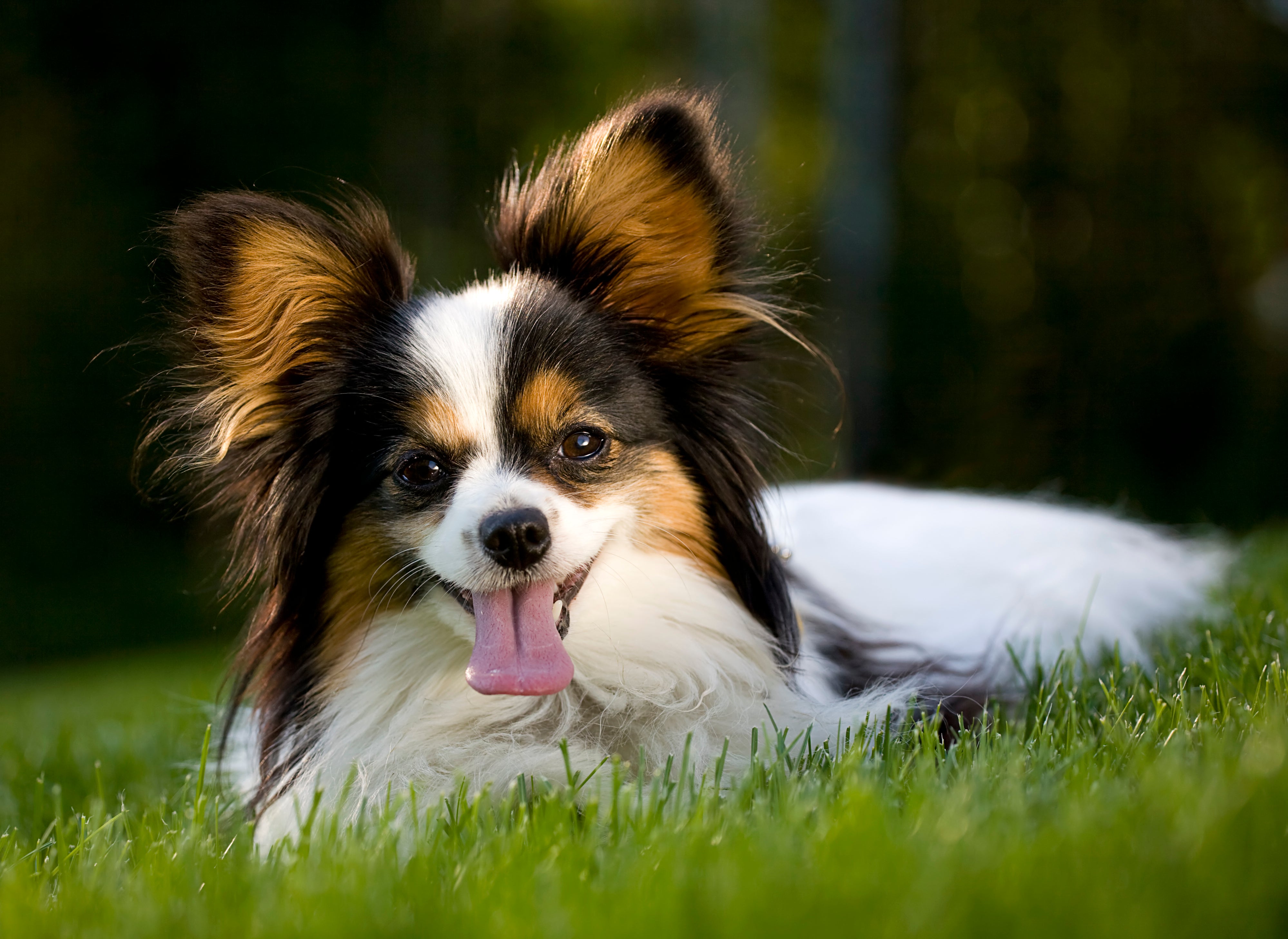Papillon
Often called the "butterfly dog" for their large, wing-shaped ears, Papillons (which translates to “butterfly” in French) possess delicate features, graceful movement, and intelligence. They are surprisingly quick and light on their feet, boasting a fine-boned structure. Their long, silky coat features varying white, black, and tan markings. Despite being known for their perked, butterfly-like ears, some Papillon dogs have pendant ears (also called drop ears), which are floppier.
Breed characteristics carousel
Learn More
The Need-to-Know
- Suitable for first-time owners
- Basic training required
- Generally healthy breed
- Enjoys active walks
- Small dog
- Minimal drool
- Requires frequent grooming
- Chatty and vocal dog
- Barks and alerts to visitors/anything unusual
- Generally friendly with other dogs
- Gets along with other pets with training
- May need additional supervision to live with children
- Needs a small yard or can happily live in the city
- Can be left alone occasionally with training
- AKC Registered Breed

Personality
Papillons are energetic, alert, and friendly little dogs that love to cuddle and be involved in family activities. These cheerful and intelligent pups get along well with other pets and children, though their small size means gentle play is important. While typically social butterflies (pun intended), some Papillons can be timid around strangers.
Descended from toy Spaniels and depicted in paintings sitting alongside European queens and princesses as early as the 16th century, these glamorous dogs were prized companions of nobility. Spain and Italy were staple stomping grounds for these treasured pups, and by the reign of Louis XIV of France, Papillons were imported favorites gracing the royal courts.
Originally, all Papillons had floppy ears, but a genetic twist of fate introduced a variation with erect ears standing proudly like butterfly wings. Interestingly, both ear types were accepted for centuries, though the erect-eared Papillon eventually became the more iconic image of the breed. In America, the floppy-eared Papillon is known as the Phalene, French for "moth.”
Over the years, Papillons have transformed from pampered lap warmers of royalty to versatile companions in modern times. Their loving nature makes them cherished family pets, while their intelligence and trainability shine in the show ring and even in agility competitions, likely a trait picked up from their sporting spaniel heritage.
The Papillon is a perfect fit for active owners who crave a lively, intelligent companion in a smaller package. Ideal owners enjoy walks, training sessions, and a little grooming upkeep. Their biggest desire? To be by your side, no matter the activity.
Despite their compact size, Papillons are quite energetic. While happy to be indoor companions, playful Papillon dogs enjoy interactive games like fetch indoors. Outdoors, their spaniel heritage kicks in, and they'll gleefully chase squirrels, chipmunks, or even insects in a secure yard.
A secure space to explore the outdoors is all the Papillon needs, plus a nice pillow to curl up on. These happy pups thrive in various living situations, from child-free homes to those with older, active owners or families with older children.
You wouldn’t think it from the sight of their flowing locks, but Papillon dogs are relatively low-maintenance on the grooming front. This is thanks to their lack of an undercoat, which means less shedding and matting. Occasional brushings with a comb or soft slicker brush are ideal, focusing on areas prone to tangles like the hind legs, behind the ears, and the "culottes."
Papillons are eager to please and their intelligence makes them highly trainable. These attention-loving pups excel at learning tricks. Positive reinforcement training will keep them happy, engaged, and eager to show off their skills. However, Papillons thrive on companionship and can become unhappy or develop bad habits if left alone for extended periods without their human or another four-legged friend.
While Papillons are friendly and love to be included in family fun, they are an ideal addition to any family. However, their small size makes them vulnerable to rough play around young children, so keep a watchful eye on them. Additionally, Papillons often form strong bonds with one person, so keep this in mind if you're looking for a dog who showers everyone with equal attention.
The cost of a Papillon from a breeder is significantly more than the cost of adopting one from a local shelter or rescue. The adoption fee usually covers additional items such as spaying or neutering, vaccines, and microchipping.
Adopting a Papillon
Interested in adopting a Papillon? Here are answers to some common questions about bringing one of these charming dogs home.
Though they are considered high-energy dogs, the Papillon dog breed is not known to bark excessively.
Because of their small stature and fine-boned structure, Papillon dogs are super fragile and can get injured easily, especially as puppies and around young children who are roughhousing. So be sure to keep a close eye on them if you bring a Papillon into your home.

Learn more about feeding and caring for your Papillon on Purina.
Did You Know
- Papillons weren't always pampered lapdogs. Originally, they were skilled mousers, using their agility to wear down rats before the final pounce.
- Look closely at paintings by famous artists like Titian, Goya, Rubens, and Rembrandt and you might just spot a Papillon.
- When actress Lauren Bacall passed away, she left her Papillon pup a whopping $10,000 inheritance to ensure its luxurious lifestyle continued.


